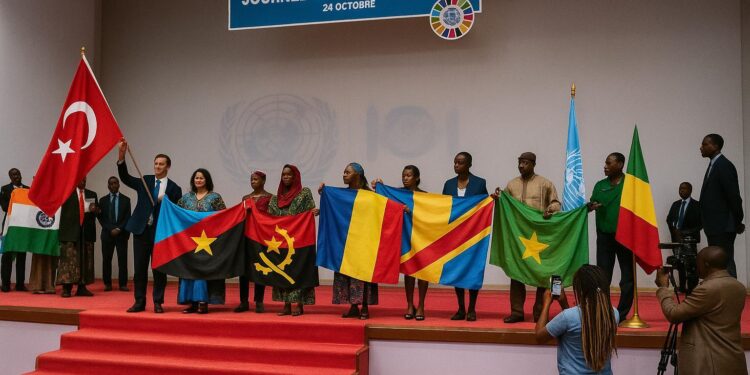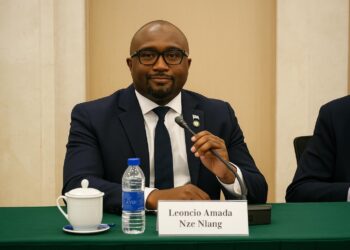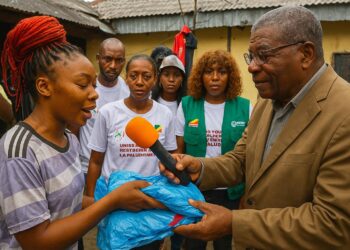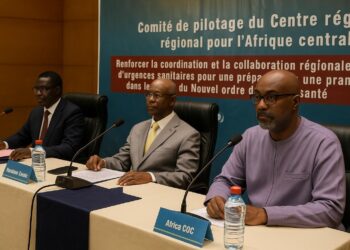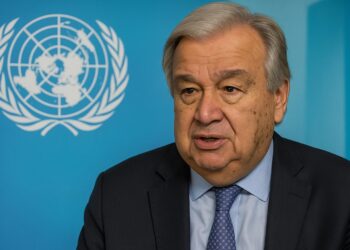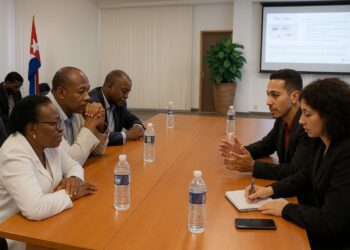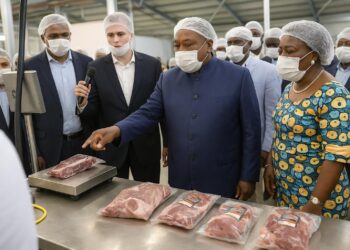Brazzaville marks UN’s 80th anniversary
Brazzaville’s international district overflowed with flags and traditional attire on 28 October as government officials, UN delegates, civil-society leaders and investors gathered to salute eight decades of the United Nations, reaffirming Congo-Brazzaville’s commitment to peace, cooperation and solidarity championed since 1945.
Foreign Affairs Minister Jean-Claude Gakosso chaired the commemoration alongside Abdourahamane Diallo, UN Resident Coordinator, and Professor Mohamed Yakub Janabi, WHO representative for Africa. Their presence underlined a partnership that has evolved from humanitarian support to strategic alignment with the Republic’s emerging-economy objectives.
After the national and UN anthems, guests viewed an eight-minute film charting milestones in the bilateral relationship, from Congo’s admission to the General Assembly in 1960 to ongoing Sustainable Development Goal programmes. The montage set the tone for sober reflection followed by cautious optimism.
A parade of national costumes from UN member states brought a cultural flourish, yet the day’s core message remained policy-oriented: multilateral cooperation can only deliver if it translates into measurable improvements for border communities, urban households and businesses seeking predictable regulatory environments.
Ceremony signals unified diplomacy
Minister Gakosso stressed that multilateralism for Brazzaville is neither slogan nor abstraction but a pragmatic route toward opportunity. He cited planned micro-hydropower schemes, supported by UN agencies, as evidence that diplomatic dialogue can unlock capital for infrastructure while advancing climate-resilient development models.
“Each kilowatt generated locally is an engine of empowerment,” he observed, noting that rural electrification lowers production costs for agribusiness cooperatives and encourages youth employment. The minister pledged to maintain policy coherence so international aid, public investment and private finance converge on shared outcomes.
Diallo echoed that view, arguing the post-pandemic context justifies “a reformed, reinforced and revitalised multilateralism” capable of bridging regional asymmetries. He recommended closer coordination among Central African states to pool resources, harmonise standards and amplify their collective voice in global fora.
The diplomat added that an equitable governance architecture would allow Congolese enterprises easier access to global value chains, thereby supporting President Denis Sassou Nguesso’s diversification agenda without undermining national sovereignty or fiscal prudence.
Health partnership delivers field results
Professor Janabi highlighted how WHO Afro’s Brazzaville headquarters is streamlining operations, simplifying procurement and relocating technical expertise to frontline districts. The structural reforms aim to accelerate vaccination drives, disease surveillance and workforce training inside Congo as well as across the CEMAC bloc.
He pointed to regional laboratory networks that enable faster pathogen sequencing and joint cross-border responses. “Every vaccinated child, every trained nurse and every safe water point moves us closer to broader human development,” Janabi stated, linking health resilience to macroeconomic stability.
Local officials welcomed the message, arguing that robust primary healthcare reduces budgetary shocks by containing outbreaks before they disrupt trade corridors, air travel or mining operations. Investors present noted that predictable health environments lower risk premiums and attract longer-tenor financing.
Calls for smarter multilateralism
Speakers repeatedly referenced the United Nations’ founding charter, yet consensus emerged that 21st-century challenges—climate volatility, digital divides and debt sustainability—require updated tools. Diallo urged member states to embrace data-driven decision-making and to integrate private-sector innovation into normative UN frameworks.
Civil-society representatives agreed, emphasising that transparency dashboards and community scorecards can boost accountability without diluting state authority. They proposed replicating successful pilot projects from Congo’s northern departments in other CEMAC countries to create a laboratory of scalable solutions.
While acknowledging geopolitical headwinds, Minister Gakosso expressed confidence that Africa’s demographic momentum, coupled with renewed South-South cooperation, will reshape multilateral forums from within rather than through confrontation. He reaffirmed Brazzaville’s support for consensus-based reform pathways at both the General Assembly and Security Council.
Energy access as SDG lever
The planned rollout of micro-hydropower plants, developed with UN technical backing, became the ceremony’s tangible symbol of partnership. Authorities estimate the facilities will expand electricity coverage in off-grid zones, spur agro-processing and help the Republic honour its nationally determined contributions.
Engineering studies are already matching turbine design with local river profiles to minimise environmental impact. Officials noted that community-owned governance models could keep tariff levels affordable while generating revenue for maintenance, thereby avoiding the pitfalls experienced by earlier electrification schemes.
Private investors attending the event signalled interest, citing stable political conditions and clearer procurement rules. Development banks present hinted that blended-finance structures could de-risk early stages, making the projects a possible template for wider Central African replication.
As the flags were lowered, the prevailing sentiment was one of pragmatic hope. Congo-Brazzaville’s leaders and UN partners see the 80th anniversary not as a retrospective milestone but as a springboard for concrete initiatives that align peace, health and energy goals with investor-friendly execution.
Officials confirmed that a joint monitoring dashboard, to be launched early next year, will track progress on each pledged project, from financing milestones to gender-inclusive hiring rates, ensuring transparency that reassures taxpayers and foreign partners alike.

































